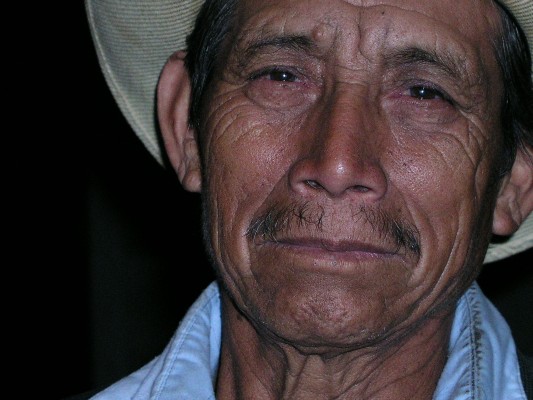I’m saddened to report the death of a fine man, Eleuterio Cruz, a campesino from the village of Xocotla high on a mountain in the state of Veracruz, Mexico. I visited Xocotla five times in 2 002 and 2003,
002 and 2003,
Eleuterio Cruz
where I met with him, played guitar with him once, and mainly listened to his stories of his town.
He was of a generation of men from the town that for 31 years spent every Tuesday taking off from the farmwork that fed their families to hack a five-mile road out of the mountain that would connect Xocotla with the rest of the world.
They started in 1945 and finished the road in 1976.
It took them that long because they had only picks and shovels.
Mr. Cruz was the grandfather of Delfino Juarez, whose story I told in my second book, Antonio’s Gun and Delfino’s Dream. He was a nice man, kind and generous, and I remember him with great fondness.
Here’s what I wrote about him in the book:
Eleuterio was born in 1933. He began working on the road when he turned seventeen. For the next generation, every boy did the same.
Today, Eleuterio is sixty-nine and has a sharp nose and jaw. His skin is taut, dark, and calloused by years of hard farming. Raising corn and potatoes all his life on a hilly patch of land made him spry. He’d played guitar in cantinas for many years; he drank a lot, then he turned to Jesus.
Eleuterio worked on the road as his twelve children were born, and as they grew up, and as they had the first of his thirty-five grandchildren. He served as mayor for a spell and organized roadwork crews.
Every man in Xocotla had to work on the road one day a week. On Tuesdays they would usually gather their tools and march down to chop, shovel, and pick at the mountain.
The Second World War ended with atom bombs. Then came the Cold War and an arms race. In Xocotla, the men had no explosives, so they hammered and chipped at solid rock, and at times clawed at it by hand, then dumped the debris down the mountain.
The world outside was changing quickly. The Cuban Revolution, the Vietnam War, the student rebellions of the 1960s, the hippie era, a man on the moon, the drugs and sex revolution, dictatorships and coups in Latin America, the Tlatelolco massacre, and the Olympic Games in Mexico City. Through it all, Xocotla’s men remained steadfast to the idea of their road. Every Tuesday the mountainside rang with their picks and shovels glancing off the rocks.
“No one died,” said Eleuterio.
One man’s foot was crushed as he hammered at a massive boulder that stood in the road’s path. No one touched that boulder for a generation after that, believing it hid the devil, who wanted to take people.
“I don’t think so,” Eleuterio said. “This person didn’t know how to use a sledgehammer, which is why the rock hit him in the foot.”
For a full thirty-one years the men of Xocotla pounded at that five-mile road. As they measured progress in centimeters, Mexico’s population went from twenty million people to fifty-five million people. Six Mexican presidents, and twelve Xocotla mayors, came and went. A Mexican middle class emerged, though none of its members lived in Xocotla. Through it all, Xocotla’s men kept at their colossal hand-carved public work. The government gave them no help until the end, when it provided a gas-powered jackhammer with which the men shattered the last obstacle in their way—that solid rock where the man had injured his foot.
Finally, in 1976, they finished. A red Jeep carried the priest from a town at the bottom of the mountain up the zigzagging, rocky five miles of one-lane road. Xocotla had a party. Eleuterio Cruz was forty-three; he’d worked on that road for twenty-six years.
My condolences to Delfino and the rest of his family.
RIP Eleuterio Cruz.



